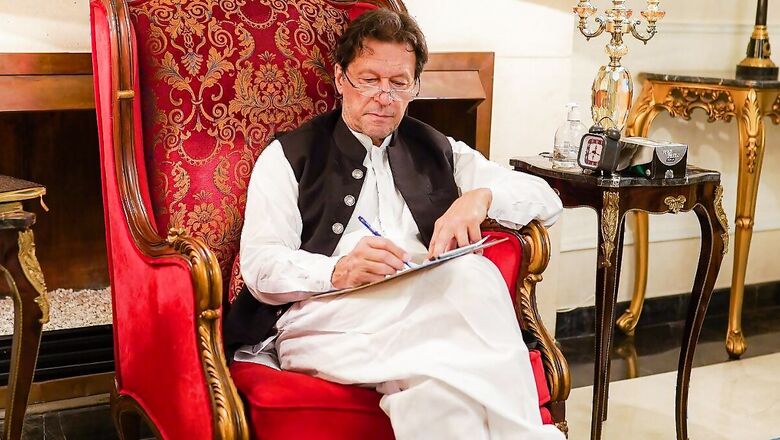
views
As I write these lines a week has passed since the arrest of former prime minister and head of the Pakistan Tehreek-e-Insaaf (PTI) party Imran Khan from the premises of the Islamabad High Court on 9 May. These seven days plunged the country into turbulence with internal divisions within organs of state and its institutions and confrontation between state organs and institutions coming out into the open. The authority of the state and of its vital institution—the Pakistan army—was challenged in an unprecedented manner by Khan’s supporters immediately after his arrest on May 9. They attacked army installations and public property in many cities.
Both symbolically and substantially none of these actions of Khan’s supporters was more significant than the ransacking of the residence of the army’s IV corps commander based in Lahore. That house was initially the property of Mohammed Ali Jinnah, the founder of the Pakistan state, and is known as Jinnah House. The visuals of some fires being lit and furniture and artefacts being smashed in the corps commander’s house as they spread, first on social media, should have sent shock waves through the country leading all sections of the political class, the army and the judicial organ of state into an introspective mood and into informal consultations. But that did not happen.
The fundamental chasms in Pakistan’s polity are too deep and entrenched interests so obstinate about the righteousness of their cause that it would be asking for the moon to expect for them to act constructively for the good of the state. However, a semblance of normalcy seems to be returning to the Pakistani street over the past 48 hours. All relevant actors have made their necessary moves and a relatively quiet period, however short, may now occur despite unresolved issues of powerplay relating to personalities, parties and above all institutions.
Before the latter part is dwelt upon, a look at the former would be useful.
A special corps commander conference was held under the leadership of army chief General Asim Munir on 15 May. The language of the long statement which was issued after the conference was somewhat more restrained than the army’s earlier statements which directly attacked the PTI. There is no doubt that the army firmly expressed its resolve to bring the perpetrators of the 9 May attacks to book including, in military courts, and also alleged that political motivations were behind the violent demonstrations but the statement did not name the PTI nor its leader. More strikingly it emphasised “need of national consensus among all stakeholders to address ongoing political instability at priority so as to restore public confidence…”. Earlier the army had refuted allegations that martial law may be imposed. This formulation seems to indicate that the army leadership is conscious that ultimately the political imbroglio can only be resolved through elections. The question is if it will be ready to allow Imran Khan to contest the election especially after his direct attack on General Asim Munir as also his predecessor General Qamar Bajwa.
The crusading chief justice of Pakistan, Umar Ata Bandial, who has through his seeming acts of partisanship on behalf of Imran Khan seems now reconciled that even though the court may give categorical orders to hold elections to the Punjab and Khyber Pakhtunkhwa assembly on a certain date—as it did in April for elections to be held on 15 May for the former assembly—there is little that it can do to have its orders implemented in the face of the opposition of the government and of the National Assembly. The latter cannot be hauled up for contempt. And, if the government does not provide funds for the election and cannot assure security there is little that the Election Commission can do. Thus, in its hearing on the subject on 15 May the chief justice was once again constrained to advise the government and the opposition to sit together to thrash out the election issue.
The fact is that in any country the judicial organ of state is the weakest of the three and in Pakistan this has been especially so notwithstanding the theatrics of some former chief justices whose own records could hardly bear the weight of full scrutiny. The next date of hearing on the election case is 23 May but it is unlikely that the government or the PTI would go, if at all, beyond a charade of consultations.
The PDM has railed against the Supreme Court for showing undue partisanship to Imran Khan. Maulana Fazlur Rehman and Mariam Nawaz directed their fusillades against Bandial but ensured that the sit-in before the court was peaceful. Now their supporters can claim that they have exposed Bandial’s hypocrisy. It was certainly imprudent of the chief justice to greet Khan in his court—even if he, as he claimed, does so to others as well—and nor was it wise of him to wish Khan “luck”, especially as he gave full relief to Khan. The lower courts, following the Supreme Court’s lead, have given him bail in almost all cases, including in some of those that may be lodged in the future!
The government has respected court orders even if Prime Minister Shehbaz Sharif has condemned the courts’ partisanship. The National Assembly too passed a strongly worded resolution against the chief justice but its threats are unlikely to be carried through.
Thus, a brief period of quietus, even if fragile, could ensue between the contending organs of state and the institutions. However, there have been and will be repercussions within each going forward. Some seem to have taken place already.
While the army has not made any official announcement it seems almost certain that the Lahore Corps Commander, Lt General Salman Fayyaz Ghani was removed on 12 May and replaced with Lt General Fayyaz Hussain Shah. An audio clip doing the rounds indicates that Salman and his family were in the corps commander’s residence when it was attacked. It is also being alleged that Salman had categorically told Munir that he would not have the blood of his fellow citizens on his hands. Is that the reason that normal precaution of increasing the guard at the residence was not taken?
The army statement claimed that the desecration of Jinnah House and the attack on military installations were meant to move the army “to provoke an impulsive reaction”. With Salman holding his hand the army was able to show restraint and claim, as its statement noted “The Commanders also communicated the anguish and sentiments of the rank and file of the Army on these unfortunate and unacceptable incidents.” It is interesting that on the one hand Salman’s inaction enabled Munir to show that the army acted with utmost restraint while, on the other, he is being, it seems, ‘punished’ for his inaction. But then life is full of contradictions.
It now remains to be seen how the PDM will proceed further on Khan. The PPP, relatively secure in its Sindh bastion, would not be too averse to electorally confront a weakened Khan. The PML(N) and the Maulana are vulnerable because of Khan’s continuing popularity in Punjab and KP. They would naturally like elections to be delayed and Mariam Nawaz was voicing her party’s view when she said that elections cannot be held as long as Bandial held office. Fissures on how to deal with Khan even if they remain below the surface will now occur in the PDM.
The judiciary will be a divided house but as long as Bandial is the chief justice Khan can hope for some relief from the courts in the many cases he will now face. However, even Bandial may not be able to help beyond a point if Khan gets enmeshed in the coils of the law in the lower courts.
Finally, the real contest will now be between Khan and Munir. The army statement of 15 May categorically asserts the force’s intention to go after the perpetrators of the attacks of May 9 and as well the “planners, instigators and abettors”. These no doubt belong to the PTI. More than a thousand have been picked up already and this process of arrests is likely to continue.
Notwithstanding all protestations of neutrality and commitment to democracy Munir cannot afford to let Khan back in the prime minister’s office. There cannot be two swords in Pakistan’s scabbard. Aware of this the army statement reiterated its bond with the people. It stressed “Forum also expressed concern over externally sponsored and internally facilitated orchestrated propaganda warfare, unleashed against the Army leadership, meant to create fissures between the Armed Forces and the people of Pakistan and within rank and file of the Armed Forces. The vicious propaganda of these inimical forces will be defeated with the support of the people of Pakistan who have always stood with the Armed Forces of Pakistan during all odds”.
If history is a guide, then ultimately the Pakistani people choose the army over a political leader, howsoever popular. But Imran Khan is giving the generals a headache for he is refusing to go quietly into the sunset.
The writer is a former Indian diplomat who served as India’s Ambassador to Afghanistan and Myanmar, and as secretary, the Ministry of External Affairs. Views expressed are personal.













Comments
0 comment